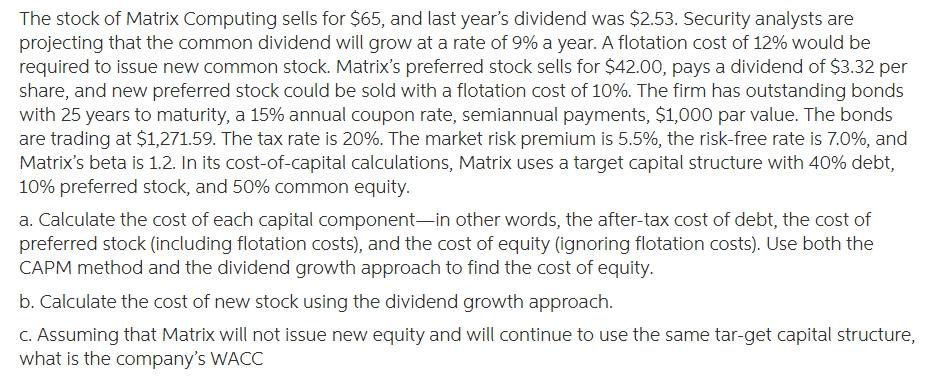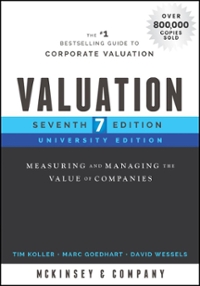Answered step by step
Verified Expert Solution
Question
1 Approved Answer
a https://www.chegg.com/homework-help/questions-and-answers/stock-matrix-computing-sells-65-last-year-s-dividend-253-security-analysts-projecting-comm-q53082026 b https://www.chegg.com/homework-help/questions-and-answers/question-1-start-partial-model-attached-stock-matrix-computing-sells-65-last-year-s-divide-q51290727 c https://www.chegg.com/homework-help/questions-and-answers/stock-matrix-computing-sells-65-last-year-s-dividend-253-security-analysts-projecting-comm-q59254324 Which one is right answer? The stock of Matrix Computing sells for $65, and last year's dividend was $2.53.

a https://www.chegg.com/homework-help/questions-and-answers/stock-matrix-computing-sells-65-last-year-s-dividend-253-security-analysts-projecting-comm-q53082026
b https://www.chegg.com/homework-help/questions-and-answers/question-1-start-partial-model-attached-stock-matrix-computing-sells-65-last-year-s-divide-q51290727
c https://www.chegg.com/homework-help/questions-and-answers/stock-matrix-computing-sells-65-last-year-s-dividend-253-security-analysts-projecting-comm-q59254324
Which one is right answer?
The stock of Matrix Computing sells for $65, and last year's dividend was $2.53. Security analysts are projecting that the common dividend will grow at a rate of 9% a year. A flotation cost of 12% would be required to issue new common stock. Matrix's preferred stock sells for $42.00, pays a dividend of $3.32 per share, and new preferred stock could be sold with a flotation cost of 10%. The firm has outstanding bonds with 25 years to maturity, a 15% annual coupon rate, semiannual payments, $1,000 par value. The bonds are trading at $1,271.59. The tax rate is 20%. The market risk premium is 5.5%, the risk-free rate is 7.0%, and Matrix's beta is 1.2. In its cost-of-capital calculations, Matrix uses a target capital structure with 40% debt, 10% preferred stock, and 50% common equity. a. Calculate the cost of each capital componentin other words, the after-tax cost of debt, the cost of preferred stock (including flotation costs), and the cost of equity (ignoring flotation costs). Use both the CAPM method and the dividend growth approach to find the cost of equity. b. Calculate the cost of new stock using the dividend growth approach. C. Assuming that Matrix will not issue new equity and will continue to use the same tar-get capital structure, what is the company's WACC The stock of Matrix Computing sells for $65, and last year's dividend was $2.53. Security analysts are projecting that the common dividend will grow at a rate of 9% a year. A flotation cost of 12% would be required to issue new common stock. Matrix's preferred stock sells for $42.00, pays a dividend of $3.32 per share, and new preferred stock could be sold with a flotation cost of 10%. The firm has outstanding bonds with 25 years to maturity, a 15% annual coupon rate, semiannual payments, $1,000 par value. The bonds are trading at $1,271.59. The tax rate is 20%. The market risk premium is 5.5%, the risk-free rate is 7.0%, and Matrix's beta is 1.2. In its cost-of-capital calculations, Matrix uses a target capital structure with 40% debt, 10% preferred stock, and 50% common equity. a. Calculate the cost of each capital componentin other words, the after-tax cost of debt, the cost of preferred stock (including flotation costs), and the cost of equity (ignoring flotation costs). Use both the CAPM method and the dividend growth approach to find the cost of equity. b. Calculate the cost of new stock using the dividend growth approach. C. Assuming that Matrix will not issue new equity and will continue to use the same tar-get capital structure, what is the company's WACCStep by Step Solution
There are 3 Steps involved in it
Step: 1

Get Instant Access to Expert-Tailored Solutions
See step-by-step solutions with expert insights and AI powered tools for academic success
Step: 2

Step: 3

Ace Your Homework with AI
Get the answers you need in no time with our AI-driven, step-by-step assistance
Get Started


